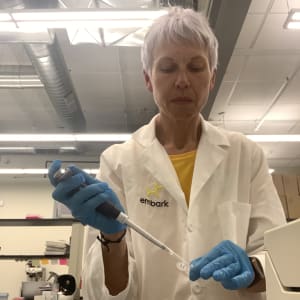Have you ever wondered what it’s like to be an Embark scientist? When your dog’s Embark swab goes to the lab to be studied, there is a lot of work that goes on behind the scenes. Ausra Milano is a research scientist who makes sure Embark’s DNA swabs are processed properly. Ausra is also actively working to advance knowledge about canine genetic health to help dogs live longer and happier lives.
1. What kind of research do you do?
We do genetic testing of dogs here at Embark and my main job is to validate or check or proofread if something goes wrong. Basically, it’s like a second way of assessing if there is some doubt or something hasn’t worked well. My job is one more step of quality control.
The other part of my responsibilities is we have a science team here at Embark that continues to make discoveries and I do the wet lab experimental parts. There are two different ways of doing research in genetics. One way of doing it is computationally on the computer which requires data mining and all kinds of experimental designs that can be done on the computer. Then, the other part of the research is you need to actually do the experiment and test it which is called a wet lab. A wet lab is basically all liquids and different things involving DNA being extracted, all the pipetting and experimenting involves tubes and buffers and solutions.

2. What do you love most about dogs and studying dogs?
Their loyalty, friendship, and affection! I have a beagle mix who is actually adopted from the research lab of the University Of Pennsylvania – they have a dog colony there where they do all kinds of research on different diseases. Then they have these dogs available for adoption and I adopted Izzy from them. I’ve been doing dog genetics research for a long time, almost fifteen years. I just love the discovery part; studying things that haven’t been done before and now we have this tool [DNA testing] and knowledge that can change so many things.
3. What is your education and research background—the road to Embark?
I am originally from Lithuania. I came to the United States over twenty years ago and I came to Philadelphia, for Thomas Jefferson University as a graduate student. I was working in a medical school in a lab and I was doing research in biochemistry actually and that was part of my dissertation. When I defended my thesis I started working at Dartmouth Medical School at the cancer center there and I was working with genomics technologies and providing service for researchers who needed genomics experimental things. We had these expensive machines that not every lab could buy and we were a service facility that was providing those services for other researchers. I was studying rare human diseases that supposedly had genetic components.
Then after that, I started looking for other opportunities and OptiGen was doing all genetic research similar to what I was doing in humans, but they were doing it in dogs. The exciting thing about that was the cuteness of dogs of course, as dogs are oftentimes much cuter than people. The other thing is that dogs in general, especially purebred dogs which are what OptiGen was focusing on, provided freedom of having siblings and parents and grandparents. We were mostly working with breeders who had ten or eleven generations of dog samples. With humans that was completely impossible to do. Working with dogs opened so many more ways to do genetics differently and make discoveries faster. I also love that we are not doing discoveries on dogs for human disease, but we are actually benefiting dogs by doing this research!
4. What has been the most surprising or exciting aspect of your research?
The most exciting and I think the most stimulating part of that is [with research] we can actually improve the quality of dogs. There are many devastating diseases that breeders and dog owners want to eliminate to improve the quality of life for dogs. Dogs live shorter life spans so it’s easy to see how the offspring (puppies) are healthy now due to the discoveries that we make, and a number of diseases are eliminated from [breeding] lines which is great.
5. How do you hope your research will support dogs and their people?
I hope that people will understand how important it is to do genetic testing. It can be fun as the Embark kit provides tons of excitement for finding out the dog that you adopted and you don’t know much about. You can discover so many interesting things that you can’t tell just from looking at the dog. That is an exciting part, but the most important part is you can improve your dog’s quality of life. I hope that people will recognize the tremendous value in genetic testing applied to treating diseases, designing dog food, increasing lifespans, and changing the behavior of dogs for the better.














